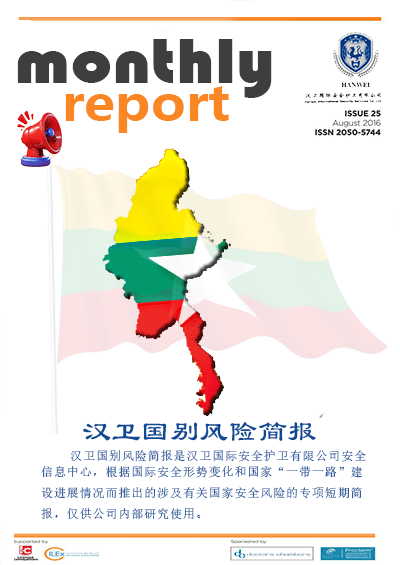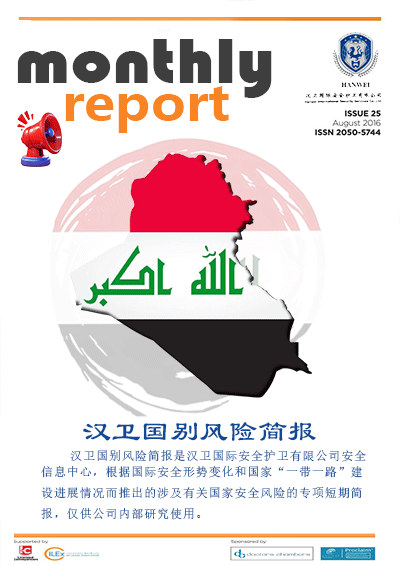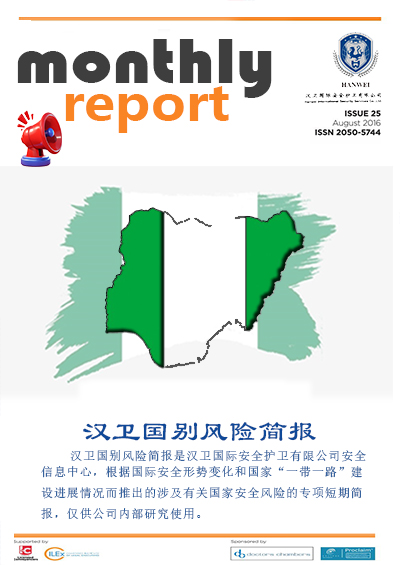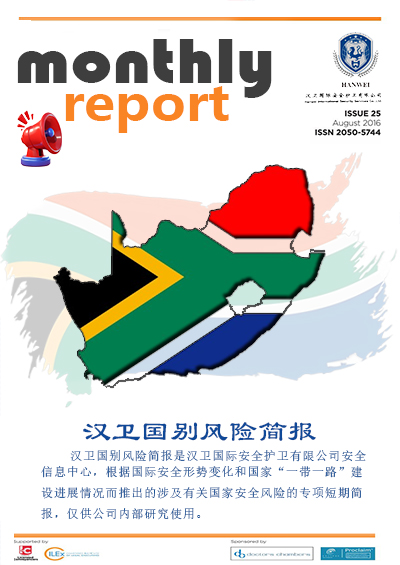Summary of Nigeria's Security Situation in October 2025
Researcher No. 007
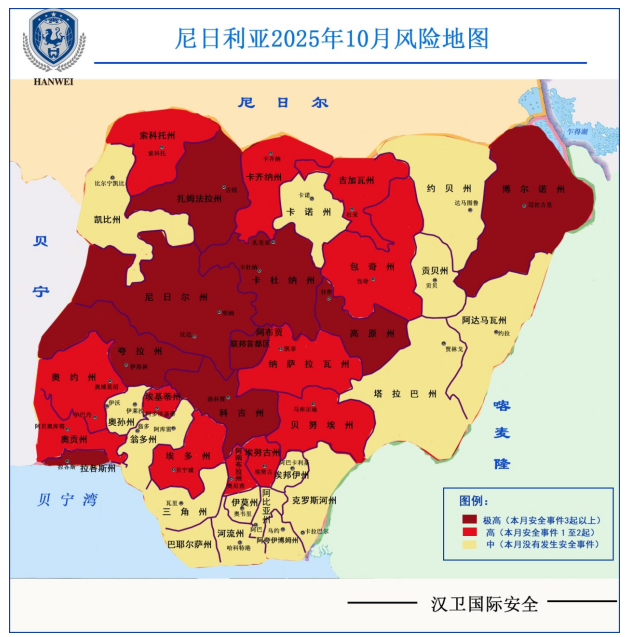
Based on monitoring reports from Hanwei International's security officers stationed in West Africa and comprehensive media coverage, a total of 71 security incidents were recorded in Nigeria in October 2025. These incidents resulted in the deaths of 197 civilians and 33 military/police personnel, with at least 144 people abducted. The main types of security incidents included armed attacks and abductions, military clearance operations, and public safety accidents.
Compared with the previous month, the number of security incidents decreased by 3, the death toll dropped by 89, and the number of abductions fell by 39. Analysis indicates that Nigeria's security situation remains severe in October: large-scale armed attacks and abductions continued to occur frequently in Kogi State (central), Kwara State (central), Kaduna State (north-central), Zamfara State (north-central), and other regions, causing heavy casualties. In addition, Nigeria experienced political unrest this month, with rumors of a military coup emerging at one point. Furthermore, U.S. President Trump re-listed Nigeria as a "Country of Particular Concern" on the grounds of religious persecution, making Nigeria's situation even more severe and complex.
In October, the security risk in central, north-central, and northeastern Nigeria was extremely high, while other regions faced medium-to-high risk.
I. Comprehensive Analysis of Security Incidents
The 71 security incidents in Nigeria in October were categorized as follows:
30 armed attacks (42% of the total)
24 armed abductions (33% of the total)
3 public safety incidents (4% of the total)
2 ethnic conflicts (2.8% of the total)
7 military clearance operations (9.8% of the total)
5 protests and demonstrations (7% of the total)
These incidents resulted in 304 deaths (including 197 civilians, 33 military/police personnel, and 74 neutralized terrorists) and at least 144 abductions. The overall security situation exhibits the following characteristics:
(1) Extremely High Security Risk in Central, North-Central, and Northeastern Nigeria
In October, security incidents in Nigeria were mainly concentrated in Kaduna State (north-central), Zamfara State (north-central), Kogi State (central), Kwara State (central), and the capital Abuja. Meanwhile, Borno State (northeastern) and Niger State (north-central) were also high-risk areas.
Kaduna State (north-central) had the highest security risk, with 11 security incidents (5 more than the previous month), primarily armed attacks and abductions. These incidents caused 24 deaths and 13 abductions.
Kogi State (central) and Zamfara State (north-central) each recorded 6 security incidents, mainly armed attacks and abductions. Kogi State suffered 36 deaths and 22 abductions, while Zamfara State reported 16 deaths and 86 abductions.
The security situation in Nigeria's southern coastal region has deteriorated again. On October 1, a ship traveling from Oron Town in Akwa Ibom State to Calabar in Cross River State was attacked by pirates, with 17 passengers abducted. This marks the second abduction incident on this route this year—20 passengers traveling from Oron to Calabar were kidnapped in April. It is reported that due to the poor condition of the federal highway connecting Calabar and Itu State, many travelers have switched to water transport, creating opportunities for pirates. The Oron-Calabar route has become a "hotspot" for pirate activities.
Additionally, according to a monitoring report from Hanwei International's security officers stationed in West Africa on October 30, the recent security situation in Kogi State and Kwara State (central Nigeria) is severe. Bandit groups have frequently launched attacks on local residents and abducted foreign citizens in the border area between the two states. In particular, they plan to attack Chinese companies and abduct Chinese citizens in Kogi State in the near future. Chinese-funded enterprises and citizens in these regions are urgently reminded to heighten vigilance, strengthen precautions, avoid non-essential travel, immediately suspend field operations, and evacuate to safe urban areas or leave the aforementioned states.
Figure 1: October Security Incident Distribution Map
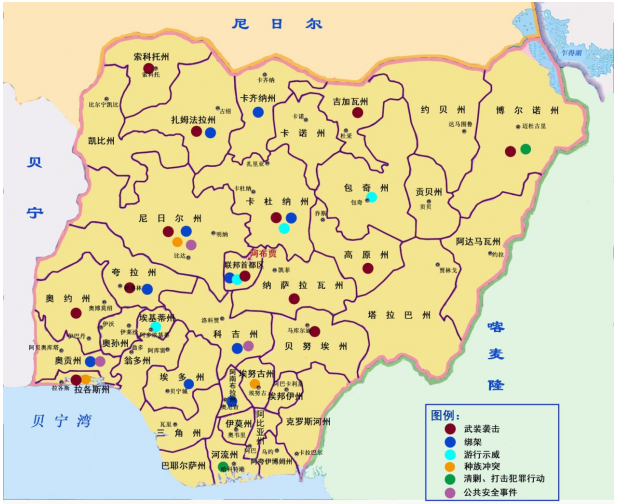
Chart 1: October Security Incident Statistics by Major Regions
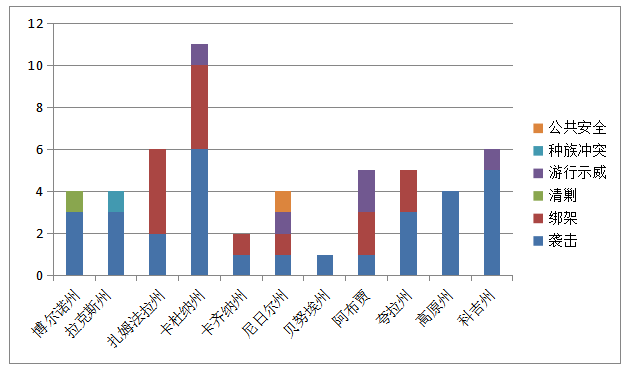
(2) Persistent High Frequency of Armed Attacks and Abductions
In October, Nigeria recorded 54 armed attacks and abduction incidents, resulting in 134 deaths and at least 144 abductions. The number of incidents remained the same as the previous month, while both the death toll and abduction count decreased. This month's armed attacks and abductions exhibited two key characteristics:
Increased Highway Attacks: According to incomplete statistics, 12 highway attack and abduction incidents occurred this month, accounting for 22% of the total.
On October 1, armed militants attacked a commercial bus near the Itobe–Anyagba Highway in Kogi State, abducting 7 passengers.
On the morning of October 11, an armed group ambushed passing vehicles along the Kwaren Ganuwa-Keta Highway in the Tsafe Local Government Area of Zamfara State, abducting 5 travelers.
On October 16, an armed group attacked a government law enforcement vehicle along the Funtuwa-Gusau Highway in Zamfara State, killing 8 members of the Joint Task Force (CJTF).
On the evening of October 24, an armed group attacked passing vehicles along the A2 Highway near Aseni Village in the Lokoja Local Government Area of Kogi State, abducting several passengers.
On October 25, an armed group attacked passing vehicles along the Yagba East-Ilorin Highway near the Egbe Community in the Yagba East Local Government Area of Kogi State, abducting 9 passengers.
On October 27, an armed group attacked passing vehicles along the Benin–Akure Highway near the Obarenren Community in the Ovia North-East Local Government Area of Edo State, abducting 7 passengers.
On October 30, armed militants abducted a neurosurgical consultant along the New Nenevi-Oba Highway in Anambra State.
Emergence of New Terrorist Organizations: Following the emergence of the new terrorist organization "Lakurawa" in the north-central region earlier this year, another new terrorist group named "Wulowulo" has appeared in central Nigeria. On October 15, Abdullahi Sule, Governor of Nasarawa State, stated that the new terrorist organization "Wulowulo"—a branch of Boko Haram—has infiltrated the north-central region and is currently mainly active in the north-central areas. The continuous emergence of new terrorist organizations will exacerbate the deterioration of Nigeria's overall security situation.
Statistics show that approximately 5,000 people have fled northeastern Nigeria to Cameroon to seek asylum since the beginning of this year due to repeated terrorist attacks.
(3) Three China-Related Incidents
In October, three China-related incidents occurred in Nigeria:
Closure of Chinese-owned Stores: On October 3, Nigeria's National Agency for Food and Drug Administration and Control (NAFDAC) shut down two Chinese supermarkets in the Jabi District of Abuja and eight cosmetics stores in Abuja's Wuse Market. The reason was that the products only had Chinese labels without English labels, violating Nigerian law. The enforcement team seized products worth over 170 million Naira.
Rescue of 4 Abducted Chinese Citizens: On October 17, the 2nd Division of the Nigerian Army rescued more than 20 abduction victims—including 4 Chinese citizens—during a large-scale anti-banditry operation in Kwara State and Kogi State.
Conviction of Multiple Chinese Nationals: On October 17, the Federal High Court of Abuja, Nigeria, handed down a verdict in a transnational cybercrime case, formally convicting 59 Chinese and Malaysian citizens for their involvement in a large-scale cybercrime syndicate. The individuals were arrested in Abuja in November 2024 on charges of "large-scale cyber fraud" and "complex hacking attacks".
(4) U.S. Threatens Military Intervention in Nigeria
On October 31, U.S. President Trump announced that Nigeria had been re-listed as a "Country of Particular Concern" under the International Religious Freedom Act. He accused Nigeria of "radical Islamists killing thousands of Christians" and posing an "existential threat" to the Christian community. Subsequently, Trump stated on the social media platform Truth Social that if the Nigerian government fails to "act quickly" to curb violence against Christians, the United States will directly intervene militarily to eliminate Islamic extremists responsible for the atrocities "with full force".
In response, Nigeria's Ministry of Foreign Affairs issued a statement stating that the U.S. claim of large-scale killings of Christians in Nigeria is inconsistent with the facts. Nigeria has always been committed to combating terrorism, promoting inter-religious harmony, and protecting the lives and rights of all citizens. Analysis indicates that the U.S. remarks may trigger new religious tensions, further spark religious conflicts and farmer-herder violence, and exacerbate Nigeria's unstable security situation.
(5) Public Safety Incidents Causing Heavy Casualties
According to incomplete statistics, Nigeria recorded 1 major traffic accident, 1 shipwreck, and 1 oil tanker explosion in October, resulting in a total of 98 deaths. Among these incidents: On October 21, an oil tanker overturned and leaked fuel while traveling on the Bida-Agaye Road in Niger State. When nearby residents scrambled to collect the crude oil, the tanker exploded and caught fire, killing 57 people and injuring 52 others.
In October, the Lassa fever epidemic in Nigeria remained severe. According to the latest report from the Nigeria Centre for Disease Control and Prevention (NCDC), as of October 12, 8,041 suspected cases, 935 confirmed cases, and 174 deaths from Lassa fever had been reported across 106 local government areas in 21 states of Nigeria, with a Case Fatality Rate (CFR) of 18.5%—higher than the 16.8% recorded in the same period in 2024. Compared with the previous month, suspected cases increased by 249, confirmed cases by 26, and deaths by 6.
Currently, the epidemic is mainly concentrated in Ondo, Edo, Taraba, and Bauchi states, which account for 67% of the total confirmed cases. Ondo State has the highest number of confirmed cases, followed by Edo State and Bauchi State. In addition, confirmed cases have been reported in Ebonyi, Benue, Kogi, Gombe, Plateau, Kaduna, Nasarawa, Enugu, Delta, Anambra, Cross River, Borno, Oyo, Ogun, Lagos states, and the Federal Capital Territory, showing a multi-point spread trend.
In terms of age distribution, people aged 21 to 40 are the main affected group for Lassa fever, with no significant difference in infection rates between men and women. Notably, Lassa fever cases typically peak during the dry season from December to April each year, but the 2025 epidemic in Nigeria has broken seasonal constraints, with new infections reported monthly, putting sustained pressure on epidemic prevention and control. The NCDC emphasizes that early medical treatment is key to improving the survival rate of Lassa fever patients and calls for strengthened collaboration between state governments, community organizations, and medical personnel to form a joint prevention and control force.
(6) Ongoing Military Clearance and Anti-Crime Operations
In October, Nigeria's security forces and police continued to conduct military clearance operations in the north-central and northeastern regions, neutralizing 74 militants and rescuing 77 abducted people.
On October 12, the "Operation Hadin Kai" Joint Task Force in the northeast killed 9 Boko Haram terrorists in Goni Dunari Village, Magumeri Local Government Area of Borno State.
On October 23, the "Operation Hadin Kai" force killed more than 50 terrorists in Borno State again, repelling multiple coordinated attacks by terrorists on military bases in Borno and Yobe states.
On October 31, the Nigerian Army stated that it had intensified operations against terrorists and criminals nationwide, rescuing 17 abducted people and arresting 20 suspects within 48 hours.
In addition, Nigerian military and police have strengthened efforts to combat oil theft and illegal oil trading, recovering large quantities of stolen crude oil.
On October 5, the Nigerian Police stated that its border patrol team seized over 100 drums of premium gasoline during anti-cross-border smuggling operations.
On the same day, troops of the 6th Division of the Nigerian Army stationed in Port Harcourt continued to crack down on oil theft, pipeline vandalism, and other related crimes in the Niger Delta region. They shut down 8 illegal refineries, arrested several oil theft suspects, and seized over 18,000 liters of stolen crude oil.
Chart 2: October Security Incident Classification Comparison

Chart 3: October Death Toll Classification Statistics
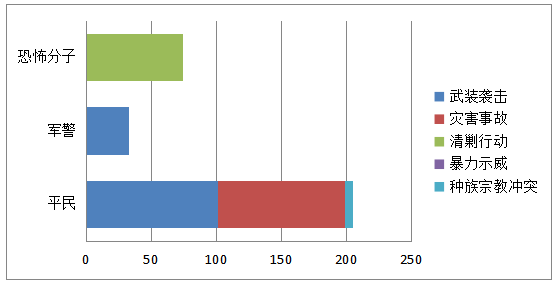
Chart 4: Comparison of Major Security Incident Counts (October vs. September)
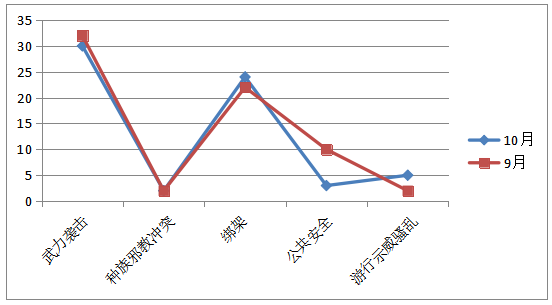
II. Risk Warnings and Prevention Recommendations
Chart 5: Recent Warning of Nigeria's Social Security Risks

Given Nigeria's complex social environment and high-risk security assessment, the following security measures are recommended:
Implement Round-the-Clock Security for Travel
In remote rural areas of Nigeria, police resources are limited, road infrastructure is poor, and security forces often respond with significant delays to violent crimes and riot-related conflicts. Therefore, Chinese-funded enterprises and related parties must:
Obtain the latest local security intelligence in a timely manner and conduct specific security assessments of travel destinations.
Arrange for security personnel to accompany all travel activities to ensure protection throughout the journey.
Strengthen Prevention and Control of Lassa FeverThe Lassa fever epidemic in Nigeria remains highly prevalent this month, with an increase in confirmed cases and deaths, and a multi-point spread trend. Typically peaking during the dry season (December-April), the 2025 epidemic has broken seasonal constraints, with new infections reported monthly. Chinese-funded enterprises and Chinese personnel stationed in Nigeria are advised to strengthen prevention and control measures to ensure personal safety.
Effectively Mitigate Security RisksMost attacks in Nigeria occur in the northeastern and north-central regions, particularly:
Central Maiduguri in Borno State, roads connecting Maiduguri to other major towns, areas bordering Niger, and Zamfara State.
Kaduna State and Abuja (where security incidents have been frequent recently).
In the event of a terrorist attack, strictly follow official instructions, contact designated security service providers promptly, and secure assistance without delay.
Install video surveillance systems at residences, business premises, warehouses, and living quarters.
Equip camps with security facilities such as trenches, high walls, barbed wire, anti-ramming barriers, buffer zones, and alarm systems.
Reinforce security forces with military and police personnel and expand the scope of defense.
Avoid lingering near potential targets of armed attacks, including government and security force facilities, landmarks, and religious venues.
Minimize time spent in crowded public areas such as northeastern Nigeria, religious festival venues, ethnically mixed areas, high-crime zones (especially highways and piracy-prone waters in the Gulf of Guinea), oil and gas facilities, government buildings, military barracks, foreign embassies, religious places of worship, schools, markets, refugee camps, and public transportation hubs.

